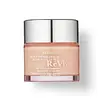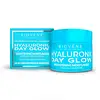What's inside
What's inside
 Key Ingredients
Key Ingredients

 Benefits
Benefits

 Concerns
Concerns

 Ingredients Side-by-side
Ingredients Side-by-side

Water
Skin ConditioningHelianthus Annuus Seed Oil
EmollientButylene Glycol
HumectantSqualane
EmollientCetearyl Alcohol
EmollientHydrolyzed Wheat Protein
Skin ConditioningHordeum Distichon Extract
Skin ProtectingArnica Montana Flower Extract
MaskingMethylsilanol Hydroxyproline Aspartate
Skin ConditioningHydrolyzed Soy Flour
Skin ConditioningGlycolipids
Skin ConditioningSodium Hyaluronate
HumectantTocopheryl Acetate
AntioxidantDimethicone
EmollientBisabolol
MaskingAllantoin
Skin ConditioningAloe Barbadensis Leaf Juice
Skin ConditioningSodium PCA
HumectantPPG-2 Myristyl Ether Propionate
EmollientIsocetyl Stearate
EmollientSorbitan Stearate
EmulsifyingCetyl Phosphate
EmulsifyingPolysorbate 60
EmulsifyingCarbomer
Emulsion StabilisingMagnesium Aluminum Silicate
AbsorbentDisodium EDTA
Triethanolamine
BufferingPhenoxyethanol
PreservativeMethylparaben
PreservativePropylparaben
PreservativeGeraniol
PerfumingCitronellol
PerfumingParfum
MaskingCI 17200
Cosmetic ColorantWater, Helianthus Annuus Seed Oil, Butylene Glycol, Squalane, Cetearyl Alcohol, Hydrolyzed Wheat Protein, Hordeum Distichon Extract, Arnica Montana Flower Extract, Methylsilanol Hydroxyproline Aspartate, Hydrolyzed Soy Flour, Glycolipids, Sodium Hyaluronate, Tocopheryl Acetate, Dimethicone, Bisabolol, Allantoin, Aloe Barbadensis Leaf Juice, Sodium PCA, PPG-2 Myristyl Ether Propionate, Isocetyl Stearate, Sorbitan Stearate, Cetyl Phosphate, Polysorbate 60, Carbomer, Magnesium Aluminum Silicate, Disodium EDTA, Triethanolamine, Phenoxyethanol, Methylparaben, Propylparaben, Geraniol, Citronellol, Parfum, CI 17200
Water
Skin ConditioningGlycerin
HumectantCaprylic/Capric Triglyceride
MaskingHelianthus Annuus Seed Oil
EmollientEthylhexyl Stearate
EmollientCetearyl Alcohol
EmollientGlyceryl Stearate Citrate
EmollientDimethicone
EmollientNiacinamide
SmoothingCannabis Sativa Seed Oil
EmollientGlucosamine Sulfate
Skin ConditioningUrea
BufferingAloe Barbadensis Leaf Juice
Skin ConditioningChamomilla Recutita Flower Extract
MaskingSymphytum Officinale Root Extract
Skin ConditioningPanthenol
Skin ConditioningSodium Hyaluronate
HumectantTocopheryl Acetate
AntioxidantAllantoin
Skin ConditioningPhenoxyethanol
PreservativeAcrylates/C10-30 Alkyl Acrylate Crosspolymer
Emulsion StabilisingTriethanolamine
BufferingParfum
MaskingBHT
AntioxidantDisodium EDTA
Ethylhexylglycerin
Skin ConditioningCitric Acid
BufferingSodium Benzoate
MaskingPotassium Sorbate
PreservativeWater, Glycerin, Caprylic/Capric Triglyceride, Helianthus Annuus Seed Oil, Ethylhexyl Stearate, Cetearyl Alcohol, Glyceryl Stearate Citrate, Dimethicone, Niacinamide, Cannabis Sativa Seed Oil, Glucosamine Sulfate, Urea, Aloe Barbadensis Leaf Juice, Chamomilla Recutita Flower Extract, Symphytum Officinale Root Extract, Panthenol, Sodium Hyaluronate, Tocopheryl Acetate, Allantoin, Phenoxyethanol, Acrylates/C10-30 Alkyl Acrylate Crosspolymer, Triethanolamine, Parfum, BHT, Disodium EDTA, Ethylhexylglycerin, Citric Acid, Sodium Benzoate, Potassium Sorbate
 Reviews
Reviews

Ingredients Explained
These ingredients are found in both products.
Ingredients higher up in an ingredient list are typically present in a larger amount.
Allantoin is a soothing ingredient known for its protective and moisturizingg properties. Because of this, it is often added to products with strong active ingredients.
Studies show higher concentrations of this ingredient can promote wound healing.
Though it can be derived from the comfrey plant, allantoin is produced synthetically for cosmetic products to ensure purity.
Learn more about AllantoinAloe Barbadensis Leaf Juice comes from leaves of the aloe plant. Aloe Barbadensis Leaf Juice is best known for helping to soothe sunburns. It is also anti-inflammatory, moisturizing, antiseptic, and can help heal wounds.
Aloe is packed with good stuff including Vitamins A, C, and E. These vitamins are antioxidants, which help fight free-radicals and the damage they may cause. Free-radicals are molecules that may damage your skin cells, such as pollution.
Aloe Barbadensis Leaf Juice also contains sugars. These sugars come in the form of monosaccharides and polysaccharides, folic acid, and choline. These sugars are able to help bind moisture to skin.
It also contains minerals such as calcium, 12 anthraquinones, fatty acids, amino acids, and Vitamin B12.
Learn more about Aloe Barbadensis Leaf JuiceCetearyl alcohol is a mixture of two fatty alcohols: cetyl alcohol and stearyl alcohol. It is mainly used as an emulsifier. Emulsifiers help prevent the separation of oils and products. Due to its composition, it can also be used to thicken a product or help create foam.
Cetearyl alcohol is an emollient. Emollients help soothe and hydrate the skin by trapping moisture.
Studies show Cetearyl alcohol is non-toxic and non-irritating. The FDA allows products labeled "alcohol-free" to have fatty alcohols.
This ingredient is usually derived from plant oils such as palm, vegetable, or coconut oils. There is debate on whether this ingredient will cause acne.
Due to the fatty acid base, this ingredient may not be Malassezia folliculitis safe.
Learn more about Cetearyl AlcoholDimethicone is a type of synthetic silicone created from natural materials such as quartz.
What it does:
Dimethicone comes in different viscosities:
Depending on the viscosity, dimethicone has different properties.
Ingredients lists don't always show which type is used, so we recommend reaching out to the brand if you have questions about the viscosity.
This ingredient is unlikely to cause irritation because it does not get absorbed into skin. However, people with silicone allergies should be careful about using this ingredient.
Note: Dimethicone may contribute to pilling. This is because it is not oil or water soluble, so pilling may occur when layered with products. When mixed with heavy oils in a formula, the outcome is also quite greasy.
Learn more about DimethiconeDisodium EDTA plays a role in making products more stable by aiding other preservatives.
It is a chelating agent, meaning it neutralizes metal ions that may be found in a product.
Disodium EDTA is a salt of edetic acid and is found to be safe in cosmetic ingredients.
Learn more about Disodium EDTAHelianthus Annuus Seed Oil is the oil derived from the seeds of a Sunflower. Sunflower seed oil is non-fragrant. It is an emollient, meaning it helps to soften the skin.
Sunflower seed oil contains many fatty acids. The fatty acids found in sunflower seeds include (from highest amount to least): linoleic acid, myristic acid, palmitic acid, stearic acid, arachidic acid, oleic acid, and linolenic acid.
These fatty acids help the skin create ceramides. Ceramides play a role in repairing the skin barrier.
Helianthus Annuus Seed Oil helps moisturize the skin. This in turn helps the skin look more rejuvenated and smoother.
Sunflowers are rich in vitamin E.
Historians believe Indigenous cultures of North America domesticated sunflowers before corn. Thus they relied on sunflower oil for a variety of uses. One such use is moisturizing skin and hair.
Sunflower seed oil may not be fungal acne safe. We recommend speaking with a professional if you have any concerns.
Learn more about Helianthus Annuus Seed OilParfum is a catch-all term for an ingredient or more that is used to give a scent to products.
Also called "fragrance", this ingredient can be a blend of hundreds of chemicals or plant oils. This means every product with "fragrance" or "parfum" in the ingredients list is a different mixture.
For instance, Habanolide is a proprietary trade name for a specific aroma chemical. When used as a fragrance ingredient in cosmetics, most aroma chemicals fall under the broad labeling category of “FRAGRANCE” or “PARFUM” according to EU and US regulations.
The term 'parfum' or 'fragrance' is not regulated in many countries. In many cases, it is up to the brand to define this term.
For instance, many brands choose to label themselves as "fragrance-free" because they are not using synthetic fragrances. However, their products may still contain ingredients such as essential oils that are considered a fragrance by INCI standards.
One example is Calendula flower extract. Calendula is an essential oil that still imparts a scent or 'fragrance'.
Depending on the blend, the ingredients in the mixture can cause allergies and sensitivities on the skin. Some ingredients that are known EU allergens include linalool and citronellol.
Parfum can also be used to mask or cover an unpleasant scent.
The bottom line is: not all fragrances/parfum/ingredients are created equally. If you are worried about fragrances, we recommend taking a closer look at an ingredient. And of course, we always recommend speaking with a professional.
Learn more about ParfumPhenoxyethanol is a preservative that has germicide, antimicrobial, and aromatic properties. Studies show that phenoxyethanol can prevent microbial growth. By itself, it has a scent that is similar to that of a rose.
It's often used in formulations along with Caprylyl Glycol to preserve the shelf life of products.
Sodium Hyaluronate is hyaluronic acid's salt form. It is commonly derived from the sodium salt of hyaluronic acid.
Like hyaluronic acid, it is great at holding water and acts as a humectant. This makes it a great skin hydrating ingredient.
Sodium Hyaluronate is naturally occurring in our bodies and is mostly found in eye fluid and joints.
These are some other common types of Hyaluronic Acid:
Learn more about Sodium HyaluronateTocopheryl Acetate is AKA Vitamin E. It is an antioxidant and protects your skin from free radicals. Free radicals damage the skin by breaking down collagen.
One study found using Tocopheryl Acetate with Vitamin C decreased the number of sunburned cells.
Tocopheryl Acetate is commonly found in both skincare and dietary supplements.
Learn more about Tocopheryl AcetateTriethanolamine is an emulsifier and pH adjuster. It is created using ethylene oxide and ammonia. This gives Triethanolamine a nitrogen core and a similar scent to ammonia.
As an emulsifier, it prevents ingredients from separating and enhances texture by adding volume to a product.
PH adjusters are common in cosmetic products. The pH of a product can affect the effectiveness of other ingredients. A product with a high pH may also irritate the skin.
Learn more about TriethanolamineWater. It's the most common cosmetic ingredient of all. You'll usually see it at the top of ingredient lists, meaning that it makes up the largest part of the product.
So why is it so popular? Water most often acts as a solvent - this means that it helps dissolve other ingredients into the formulation.
You'll also recognize water as that liquid we all need to stay alive. If you see this, drink a glass of water. Stay hydrated!
Learn more about Water